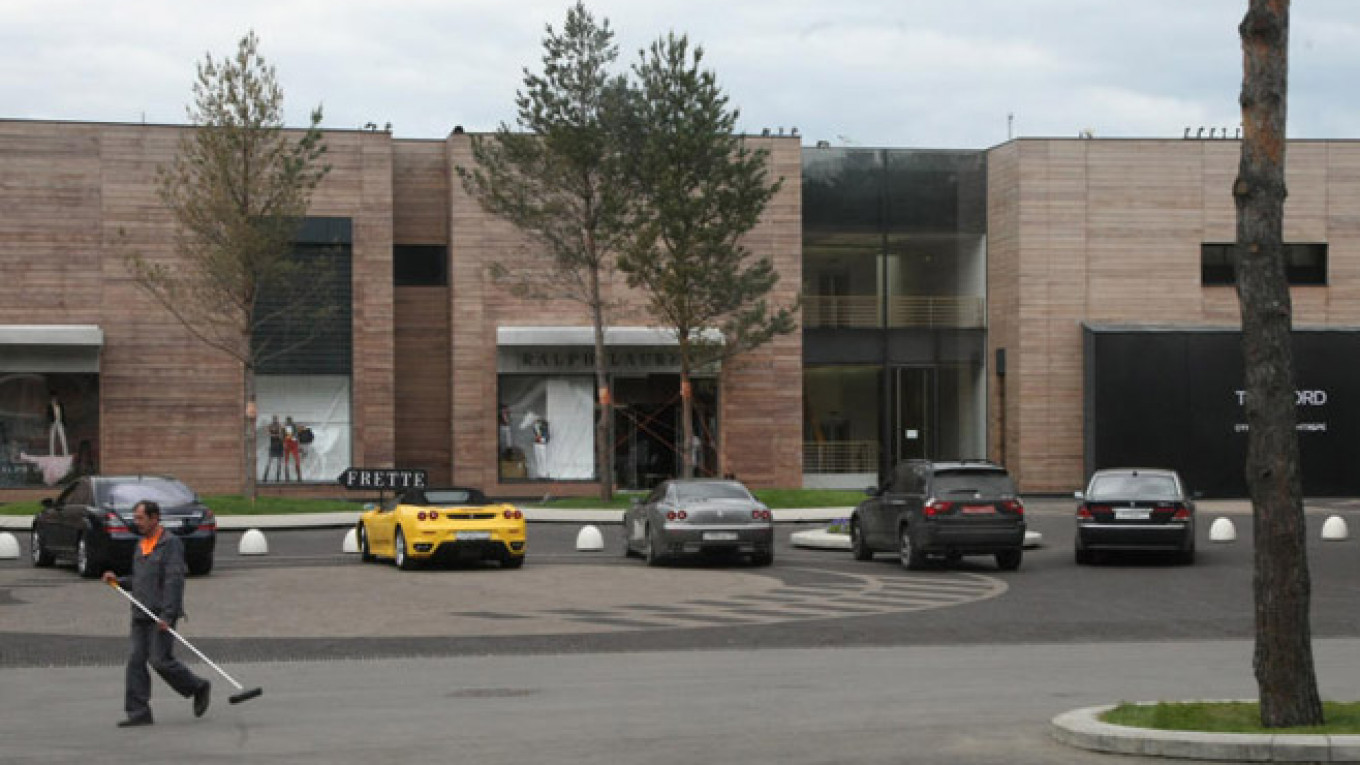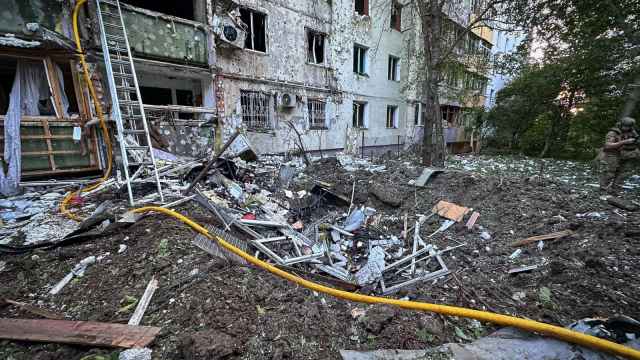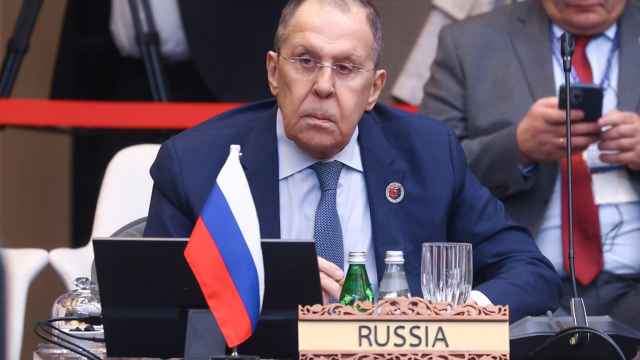Russia's relations with the West may be scraping historic lows, and the economy may have plunged into crisis, but a select crowd of expats — the nannies of Rublyovka — are flourishing.
Though patriotic fervor has soared in Russia, with President Vladimir Putin's approval ratings hovering well above 80 percent despite the financial and diplomatic difficulties that have ensued since last year's annexation of Crimea, a drive through the ultra-luxe Moscow suburb of Rublyovka evidences a certain desire of the country's elite to prepare their children for life abroad.
"Bilingual kindergarten: for the future of your children!" Thus proclaim a string of billboards along the highway from the capital to Rublyovka
"British Kindergarten. 100% English language," reads another.
The advertising firms seem to be tuning into the desire of Rublyovka's residents — which include the likes of oil executives, government officials, tycoons and celebrities — to start their children along the path toward English fluency practically from birth, thus potentially putting them on track to study at some of the best universities in Europe and the United States.
As it is, many of Rublyovka's youngest inhabitants speak English fluently by the time they finish grade school, a task that often requires the services of a small army of expats.
Above the Crisis
Expats equipped with the qualifications to work with the children of Russia's elite as nannies, tutors, governors or governesses stand to earn a small fortune despite the economic downturn that has gripped the rest of the country.
A number of agencies have popped up over the years to connect wealthy Moscow families with promising foreign candidates.
Jason Farrell, the British director of the Moscow-based recruitment agency Gouverneur International, said in an interview with The Moscow Times that business is booming, as if Rublyovka has barely noticed the financial crisis.
"There has even been an increase in the past couple of weeks [of requests for high-end childcare workers]. This January we had four new requests to find nannies from London. That's a lot for a period of the year when Rublyovka's residents usually go on vacation," Farrell said.
Established in 2008, Gouverneur International typically makes between 12 and 25 full-time placements each year, with families paying a fee of 20% of the hire's annual salary in commission to the company. British professionals are by far the darlings of Russia's wealthiest families, Farrell said, as they are broadly considered to have the best handle on the English language. British expats can easily earn £1,000 weekly.
Lifestyles of the Rich and Famous
Adapting to the lives of luxury led by Russia's wealthiest citizens is an inescapable part of the job, one that can take either a fascinating or unnerving turn, depending on the family a candidate is paired with.
Anna Martin,* 29, relocated to Russia in 2011 from Wisconsin, where she had studied Russian language and literature. In 2013, she started teaching a Rublyovka toddler. She recalls having been mesmerized by the marble countertops in the kitchen, and the family's full set of antique polished brass.
In the year she spent working with the boy, Martin only once met his mother, whom she characterized as a "typical Rublyovka wife" — blonde, with plump lips, shockingly large breasts, sky-high cheek bones and a perfectly structured nose.
When Martin first arrived, she was shocked to find that she would have to pass through three separate security checkpoints in order to gain entry into the family's sprawling mansion for her thrice-weekly lessons.
Martin also noted that her work with families such as this one required flexibility and a liberal willingness to roll with the punches. Lessons are often cancelled; families leave Moscow for vacations for weeks at a time, often without compensating childcare workers for the lost time. Hours were often longer than anticipated, and hypochondria ran rife.
"If I sneezed or coughed, someone would suddenly appear to take my temperature or check my tissue after I blew my nose," she said.
As far as she was concerned, the difficulty was worth it. Martin, like most of the expats servicing these high-end families, was paid extremely well: 6,000 rubles ($118) per 90 minute lesson.
Jane Lu, a 34-year-old tutor from Toronto, has likewise observed her fair share of colorful antics among Russia's elite. She described a child's birthday in December last year as the ruble plunged against the dollar. A wild pig and a pony performed tricks, performers conducted an elaborate puppet show and a troupe of dancers delighted the kids in glow-in-the-dark fairy costumes.
Such epic celebrations are hardly unusual. Martin was told by a 12-year-old how he celebrated his winter holidays by jetting between Sydney, Spain and New York.
Lu was hired to teach Chinese, but more often than not found herself speaking English. "I had to teach Chinese to a 9-year old kid between 2012 to 2015," she said. "But I had to communicate with everyone in English." For a family with four children, "there were two Russian driver-bodyguards, three nannies — French, Italian and English — and three housekeepers from the Philippines." Several of the nannies who spoke with The Moscow Times pointed out that their Russian counterparts among the household staff often earned less than 30,000 rubles ($594) per month.
Idiosyncratic though Lu’s and Martin’s experiences may have initially seemed, they have adjusted and they enjoy working with these families.
Things don’t always work out so smoothly in the VIP nanny scene. One Rublyovka nanny said in an interview that she broke her contract with a family after she walked in on the father watching porn and the mother traipsing around naked as the children played underfoot.
Many of these expats are likewise bound by confidentiality clauses, as well as unwritten rules of etiquette.
“We don’t go into details about how [the families we work with] gained their wealth and status, and we don’t mention politics in conversations,” Martin said. “This way, we make sure we keep our jobs.”
When Cash Isn't Enough
Maria Zviagintseva — director of the bilingual kindergarten Goosenok in Novaya Riga, another wealthy area northwest of Moscow — echoed Farrell's sentiment about the profitability of being British among Russia's wealthiest, but noted that the extra funds are not currently persuading many British candidates to apply.
"British teachers with five years of experience, especially those certified by Cambridge University to work in a primary school, are hired in other countries for $3,000 monthly to work 30 hours per week, with a flat and travel expenses included," she said. "In Russia, such candidates demand $5000." In addition to Russian teachers typically working 50 hours a week, Russia is a "country where people don't want to go," she said.
Citing the political climate, Zviagintseva noted that applications from abroad are generally becoming fewer and further between. "Three years ago when a vacancy was announced, I got a hundred applications per week. Now I get two. People are afraid because propaganda says Russia is a bad country, it's dangerous to live and work here," she said.
Zviagintseva added that in December 2014, two of her employees from Ireland and the United States confided to her that they were "afraid" to continue living in Russia.
"We are afraid of being attacked because of the anti-Western sentiment in Russian society," they said, Zviagintseva recounted in comments to The Moscow Times. Ultimately, the American lost his nerve and left, ending a four-year stint in Russia.
But 28-year-old Claire Doherty, the certified primary teacher from Ireland, stayed. "I realized I shouldn't read the news anymore; the news makes you panic," Doherty said in an interview with The Moscow Times. "I work with 14 kids aged between three and four. In the morning when they run to me calling out, 'Hello Claire, how are you?' I feel happy. I love my job and I think Russia will be just fine!"
But if there are expats who want to escape, they are not alone; many parents in Rublyovka seem to be preparing their children for emigration as well.
Last year, 11 of the children that had been attending Zviagintseva's kindergarten left Russia, she said. "Their parents decided to take the kids abroad suddenly. Normally they wait till their kid is at least 12 years old… It happened right after the situation with Crimea escalated and war in the Ukraine began... People were afraid for the future of their children," she surmised.
Only 50 children remain in attendance at Goosenok. The kindergarten, which parents pay 90,000 rubles annually for their children to attend, has lost three million rubles in profits due to the sudden wave of departures.
Changes like these can spell instability for childcare workers, a reality Martin experienced first hand.
"In August last year, they promised me $2,000 per week and an apartment for teaching their 2-year-old kid. I thought it was great. I no longer had to worry about working my schedule around other students, hailing taxis and sitting in Rublyovka traffic. I could work for them only!"
In September that all came to an end. Martin was fired and given two days to vacate her apartment. "As far as I heard, the other staff in the household also had big salary cuts," she said. "They still owe me $800."
She is now working for a school in central Moscow, far from the dazzling lights of Rublyovka.
But this instability is not enough to deter incoming high-end childcare workers who see a promising opportunity against the backdrop of the financial crisis. Drake Wilson,* a 29-year-old Canadian, recently moved to Moscow with his sights set on life in Rublyovka: "To work with kids is fun. I have fun and earn good money — what else do I need?"
Russia may be unpredictable, and the rich and famous quite eccentric, but Russians value education and are willing to pay for it. As long as the residents of such wealthy outposts as Rublyovka remain committed to seeing their children educated abroad, the demand for native-speaking tutors from abroad will remain great.
*The names of Anna Martin and Drake Wilson have been changed to protect the identities of these individuals, who are generally forbidden from speaking about the details of their jobs.
Contact the author at [email protected]
A Message from The Moscow Times:
Dear readers,
We are facing unprecedented challenges. Russia's Prosecutor General's Office has designated The Moscow Times as an "undesirable" organization, criminalizing our work and putting our staff at risk of prosecution. This follows our earlier unjust labeling as a "foreign agent."
These actions are direct attempts to silence independent journalism in Russia. The authorities claim our work "discredits the decisions of the Russian leadership." We see things differently: we strive to provide accurate, unbiased reporting on Russia.
We, the journalists of The Moscow Times, refuse to be silenced. But to continue our work, we need your help.
Your support, no matter how small, makes a world of difference. If you can, please support us monthly starting from just $2. It's quick to set up, and every contribution makes a significant impact.
By supporting The Moscow Times, you're defending open, independent journalism in the face of repression. Thank you for standing with us.
Remind me later.






